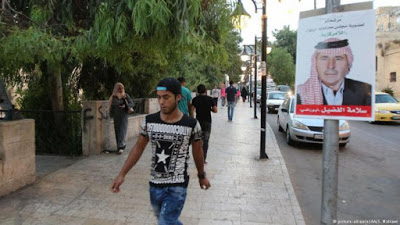A slow awakening
 |
| Yazan Ashqar 12.06.2018 |
What is causing the generational conflict in Amman? Two poles are currently in the process of emerging, pitting a new independent cultural identity against a politicised rural and Bedouin one.
In recent years, Jordan has been shifting steadily towards its own ʹawakeningʹ. National institutions are constantly being questioned by Jordanian youths and changing values are caught between two contradictions: firstly, a daily political/economic reality that affects culture, education, family relations, not to mention the dynamics between young people and urban life, and secondly, the media representation of the cultural values of young people.
The influx of refugees following the U.S. invasion of Iraq in 2003 and the beginning of the Syrian uprising in 2011 has affected Jordanʹs economic, political, social and cultural landscapes. Sure enough, diversity is promoting a healthier environment of cultural exchange and dialogue in Amman. Yet the country is also plagued by stagnating state reforms, governmental mismanagement and corruption, as well as reduced regional aid, all of which places a burden on Jordanʹs infrastructure.
Two generational cultural conflicts
Under these contradictions, two generational cultural conflicts are currently emerging in Amman, pitting a new independent cultural identity against a politicised rural and Bedouin one. Dr. Aseel Sawalha argues that the conflict is also a political one. Dr. Sawalha is a Jordanian researcher who is currently researching this identity and the desire for more individual freedom.
This generational ʹshifting of valuesʹ is projected not just onto one sector of the Jordanian society, but onto society as a whole, even if such a suggested grouping implies some sort of unity. On the contrary, however, the concept of a culturally-unified Jordanian society doesnʹt exist, but is merely the image propagated by national and official media.

Younger generation boosts womenʹs rights: last year, the Jordanian parliament abolished a controversial law, which had allowed rapists to go unpunished if they agreed to marry their victims. The paragraph – Article 308 – was finally deleted in August 2017 during a programme of penal reform. Young women had been fighting for the abolition of Article 308 for years
Zoom in and you will find many complex and interrelated sets of norms, traditions and cultural values that cut across the many socio-economic divides. In this regard, any talk about a generational cultural conflict should necessarily take this reality into consideration.
Exposure to western lifestyle and cultural values, mediated by large viewership of foreign film and TV productions, as well as the Internet – and more recently the rising number of foreign expats residing in Amman and their various methods of interactions with the local youth (in jobs made possible by NGOs, and also in cultural neighbourhoods such as Jabal Al-Lweibdeh and Jabal Amman) – are all helping to trigger a cultural shift in values where it is economically and culturally viable to do so.
Young people seeking independence
Although the family-centred society is still largely intact, just like almost anywhere in the Middle East, it is facing objections from a large sector of Ammani youth seeking a greater sense of individuality, privacy, freedom of cultural and political expression, living independently, postponing marriage – and creating and subscribing to subcultures. Nor should it be forgotten that well educated young men and women often regard marriage itself as an easy way of escaping the familyʹs clutches.


